
This year’s Red Tie Gala was a huge success as well as a fun night for all attendees!
Held at Shannon Hall in Batavia, IL, this year’s theme was Red Tie Gala Goes Gaelic. Many guests joined in the theme and attended the event dressed as kings and queens or in traditional kilts.
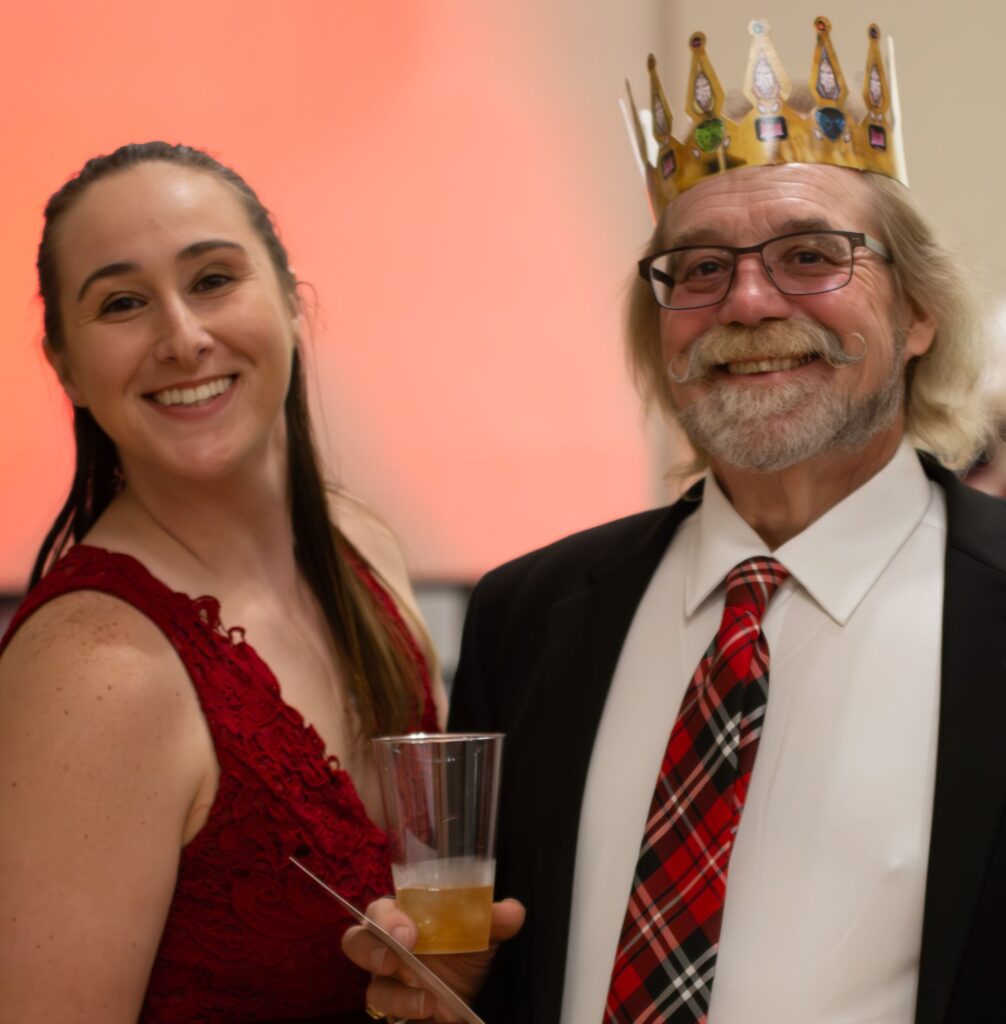

The Red Tie Gala is the annual event that funds the Chris Patterson Performing Arts Awards. Through this year’s event and online fundraisers run during March, six awards have been funded for 2025! The foundation is excited to add a sixth area high school next year and will announce which 6 area high schools will be eligible later this year.
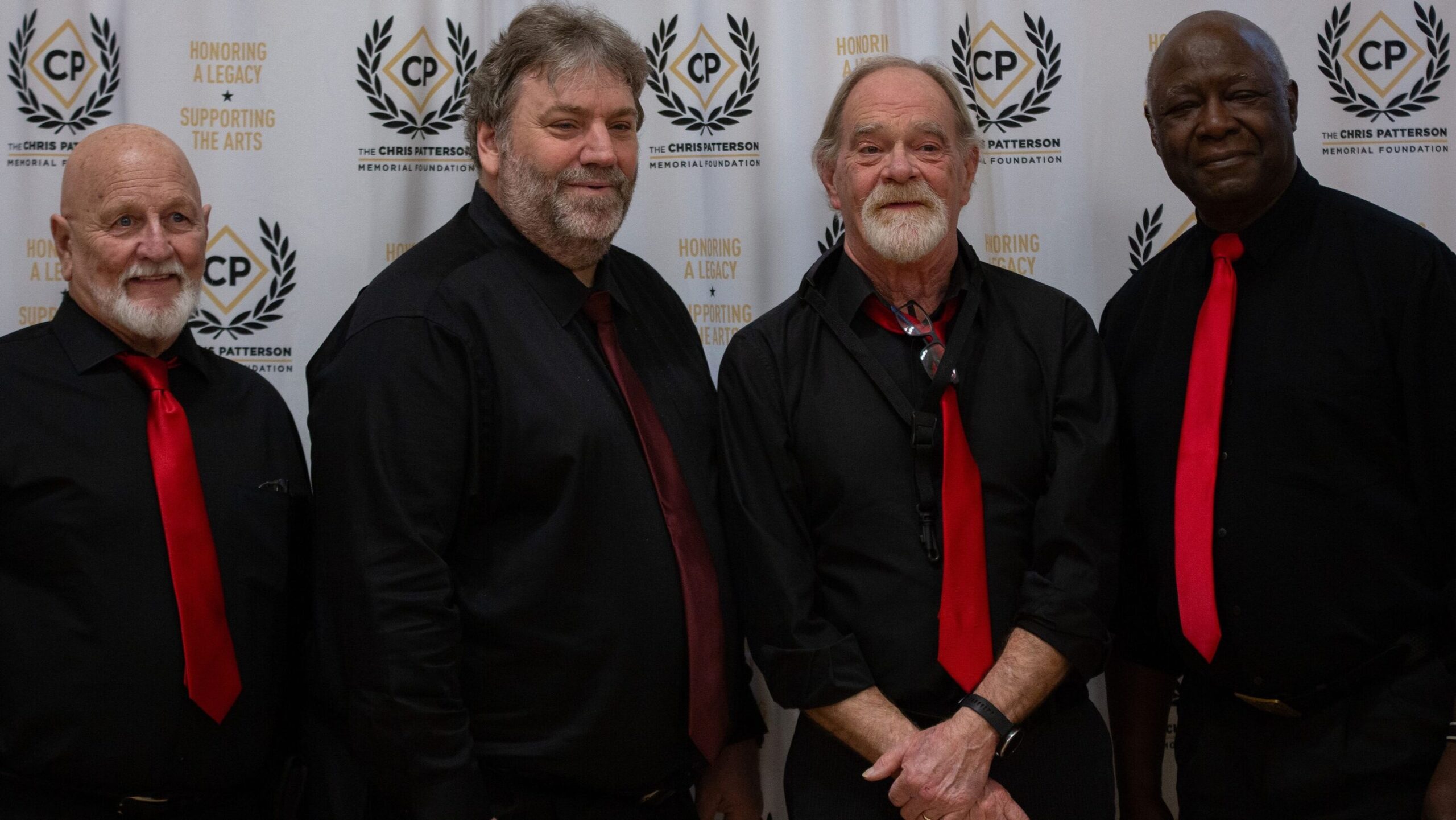



Thank you to The Ron Porter Band for being the musical entertainment for the night!
Many people and organizations assisted in putting together this year’s event and making it a success. An event of this size could not be held without the sponsors, the donations, and the volunteers who worked to make it happen. Thank you!
This year’s Red Tie Gala Sponsors include:
Bob Jass Chevrolet and Roosevelt-Aurora American Legion 84
State Representative Stephanie Kifowit
Wealth Financial Strategies, Fox Valley Veterans Breakfast Club, Family of Thomas J Murphy
Home Depot – Geneva, IL, Acquaviva Winery & Ristorante, Pollyanna Brewing Company
Thank you to Allegra Marketing Print Mail and Flip Design Studio for all of the printing and design tasks for our events. We appreciate your continued support!

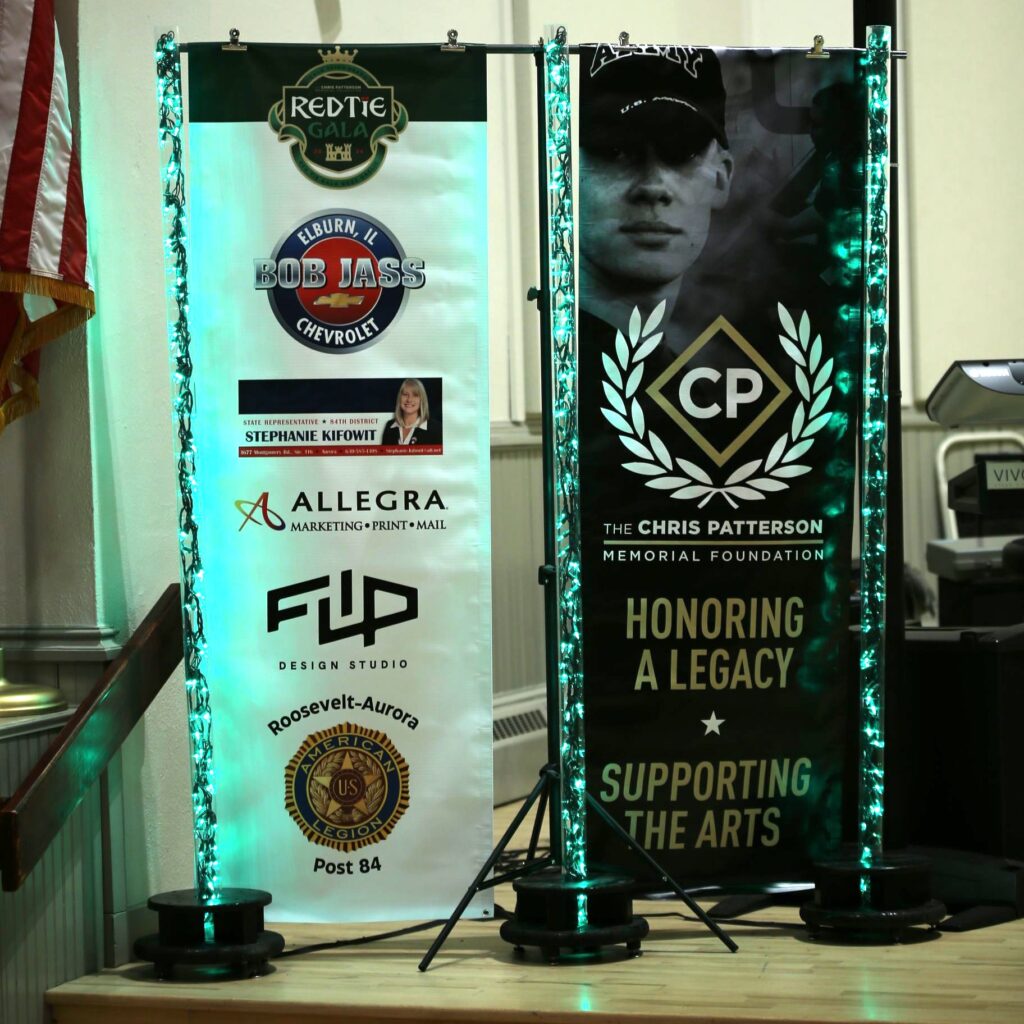
Two of our 2023 Performing Arts Award recipients were able to attend this year’s gala. Batavia High School Alumni, Morgan Hutchens, and West Aurora High School Alumni, Rebecca Evans. Over the past 7 years, the foundation has given out over $26,000 to award recipients like Morgan and Rebecca. Learn more about these awards and read recipient essays on the Performing Arts Awards webpage.



Thank you to everyone who attended this year’s Red Tie Gala! See you next March 2025!
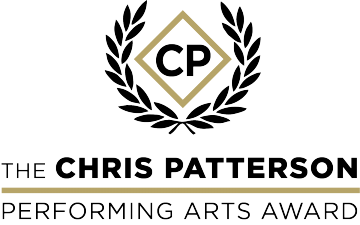
The Chris Patterson Memorial Foundation is excited to announce the 2024 Chris Patterson Performing Arts Award recipients.
West Aurora High School
From West Aurora High School, the recipient was Ashlee Marin!
The Winning Submission
Throughout my years at West Aurora High School, I have been involved in the Wind Symphony and the Marching Band, as well as the theater troupe and assemblies. With being so involved, I had to learn to manage time and deal with the stress of the workload. I am an all-honors student involved in many AP classes, including AP music theory, these classes give me plenty of work to complete at home.
Starting with music, I am a member of the Blackhawk Marching Band and the Wind Symphony. As a member, I must practice and memorize so much music and drills that it gets tough. I learned how to give some time to myself and motivate others around me. As a section leader of the flutes, I am given the task of caring for 27 students and making sure they are all participating and learning. In all honesty, my flutes are the reason I am eager to do marching band, they are so lively, and I know that they are supported through one another. Being in a band has taught me to memorize and practice things that I find difficult and work them out. If there is a problem I am having with an assignment, I break it down and work on it. I can put my home practice style into how I do my regular schoolwork, this advances my studying and raises my grades overall.
Theater has definitely been a huge part of my high school career. I have been in the theater class and programs since freshman year, and as a result, I have learned to take pleasure in being in front of others and opening up. It makes me more open to talking to teachers and genuinely asking for help when I am struggling. I have received immense support from my theater class and with that, I know I have friends to help me and be by my side. I have been able to host study sessions with a lot of my friends from the theater class and people who I was in shows with.
Being a part of the Arts has given me the resources to learn how to study better and be an overall better student. I have learned how to manage time, study better, remember vital information, find a good study group, and how to open up to others. I have truly enjoyed being a part of the Performing Arts programs here at West and I could not be prouder to have been in it for so long.
Batavia High School
From Batavia High School, the recipient was Kyle Holzman!
The Winning Submission
Last summer, an orange squeak-toy pig with a lei, flowered shorts, and sunglasses became the answer to my problems. Heading into my fourth and final year of marching band, I was selected to be a leader. I was nervous because I was not confident that I would be able to do a good job and foster a fulfilling experience for my section and bandmates.
Early in the season, I bought “The Pig”. I intended for him to be a joke purchase for Spirit Week to help us get some extra points for Hawaiian Day – but he turned into a low brass section mascot. I used his “melodious” squeaks to keep time during sectionals. During breaks, if someone felt frustrated or needed to let their anger out, I’d toss them The Pig to squeak. The Pig was great for playing catch with. During or before big competitions we would “bless” members with The Pig. The Pig helped connect us during brutal, physical eight-hour days.
One memory that stands out to me was my last performance. It was at Illinois State, and we made the finals. As we left the field, after our best performance of the season, I made eye contact with one of the baritones. He was a shy freshman, and I would always give him The Pig to balance on his head. When I looked at him, after this performance run, he looked back at me with tears in his eyes. I realized in this moment that the actions I made and the things I did were not about me but about others. I helped a new member of the section feel welcome and have a positive first experience and to me, that was worth more than a five-dollar plastic pig.
This past year, I learned how to better connect with people, and it’s made a big difference in my life. Being social is Something that (like music), I can practice. Working in group projects in English class or History is no longer something I dread. I feel more confident talking to my teachers, my classmates, and how to ask for help. Marching band has taught me how to connect with others and has helped me grow not just as a student but as a person.
East Aurora High School
From East Aurora High School, the recipient was Diego Garcia!
The Winning Submission
Performing Arts, more specifically band, has played a pivotal role in shaping my educational journey and general outlook on life, both directly and indirectly. Through my involvement in jazz bands, theater pits, and music theory, I have cultivated skills and a mindset that extends far beyond simply musical proficiency.
The environment created within our school’s music wing has provided me with lessons about dedication, collaboration, and personal growth. The act of performing has provided me with a profound sense of accomplishment. The joy you get when the culmination of hours spent practicing a piece pays off in a performance is immeasurable, and I would not trade it for anything. The showcase of your dedication and hard work is something I strive for in any journey I embark on. I have learned that struggle, uncertainty, and turmoil always pay off with the satisfaction of success for those who are willing to invest the necessary effort.
Furthermore, my involvement in the band has fostered a welcoming attitude towards criticism and feedback. Music has taught me to embrace feedback as an opportunity for improvement rather than taking criticism as a personal attack. By setting aside your ego and keeping an open, non-biased mind, the expansion of your skillset is inevitable. This is not only important in music but is applicable in any area of life, whether it be academics or any other endeavor.
The process of perfecting a musical piece draws many parallels to the steps required to excel academically. Just as in learning a complex musical composition, education requires patience, persistence, and commitment for incremental progress that may sometimes be barely noticeable. What matters is that each incremental step, even if small, puts you a step closer to the goal. This realization has helped me cultivate a mindset of continuous improvement. Understanding true proficiency never comes easy and is achieved through diligent effort over time. Music has also taught me the importance of prioritization and focus. In a world filled with distractions and constantly having new things to pursue, having the ability to concentrate on one task at a time is invaluable. You can’t achieve true excellence in one area if you are trying to achieve similar excellence in fifty other areas. Through my involvement in music throughout high school, I have not only improved as a musician but also developed skills that have enriched my academic journey and prepared me for future endeavors.
Kaneland High School
From Kaneland High School, the recipient was Jackson Guidry!
The Winning Submission
The Performing Arts have been an integral and meaningful aspect of my life. In the performing world, punctuality and effort are not an option, but a requirement. In order to display my best and most polished work, putting effort forth and being organized is the one true way I can dedicate myself to performing. Learning lines, memorizing music, and perfecting techniques are affected by punctuality and are fully made up of the effort I put into my work and performances. Learning to work this way aids me educationally because I can apply these skills to have the most satisfying results in class.
Geneva Community High School
From Geneva Community High School, the recipient was Erin Hendrain!
The Winning Submission
Throughout high school, I have participated in band, choir, and theater. People might think that music is not connected to core educational classes but that is not the case. Music has given me confidence, taught me to think on the spot for classroom conversations, helped me to see the underlying story of books I have had to read, and has given me an escape and relaxation when working on homework.
Through the process of performing solos and in ensembles, I have gained a newfound confidence that I bring with me to every presentation, allowing me to shake away the nerves. The unexpected occurrences that can happen during performances have enabled me to think on the spot for classroom contributions. Having to identify and understand the meaning of each song in both choir and band has helped me to notice subtle nuances within required reading texts for school. This has helped me see details that others not involved in music might not see. Finally, I listen to music quite frequently, but especially when doing homework. Some find it distracting, but for me, it is the opposite. Listening to music allows me to focus on my work while also having some joy and movement.
Music improves my abilities in core educational classes, and I am beyond grateful for my involvement in choir, band, and theater.
Leave a Reply

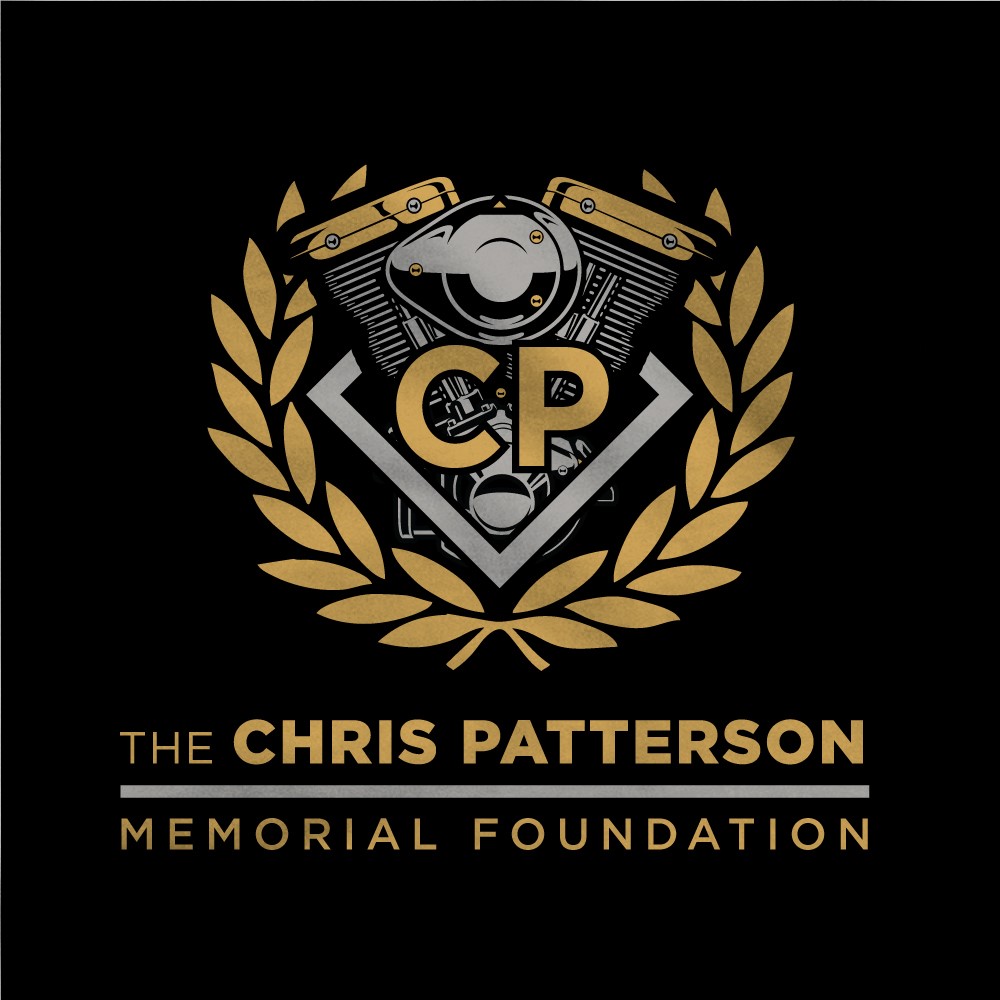

Tickets for the 7th Annual Chris Patterson Memorial Foundation Motorcycle Ride, scheduled for August 12th, 2023, are now available. This yearly event in August brings together the “For God and For Country” aspects of the foundation’s mission.
“We started this fundraiser, the Motorcycle Ride, as a way of connecting Chris’s love of the Arts with his love for the military. Every year, 2 organizations are selected to be the recipients of the money raised through this event with a focus on organizations that support those causes. It will be a fun day for everyone and we hope to see you there,” stated Robert Patterson, Chris’ father and board member of the Foundation.
Join us on Chris’ Last Ride, a scenic 50-mile journey through the countryside, passing by significant locations such as West Aurora High School and Immanuel Lutheran Church. The ride will be fully police-escorted, ensuring a safe and enjoyable experience for all. Registration will start at 8 am on the day of the event, with kickstands up (KSU) at 10 am.
This year, the event will begin at Pollyanna Brewing in St. Charles, where we will also have an after-party from 12 pm to 2 pm. The after-party will feature live music, raffles, and delicious food from Mission BBQ. Please note that the after-party is included in the ride tickets, but standalone tickets are also available for those who only wish to attend the after-party.
“I believe that this is exactly what Christopher would be doing. He would have disliked the spotlight of an event honoring him, but he would be riding in other memorial rides to honor the fallen,” stated Social Media Director for the foundation, Rachel Bailey. “It is through events like this ride that the foundation supports programs that are meaningful to who Christopher was and his legacy.”
A portion of the proceeds of this year’s motorcycle ride will be going to K9s for Veterans and Immanuel Lutheran School music program in Batavia.
Register now at: https://chrispattersonmemorial.org/product/7th-annual-motorcycle-ride/
Ride Tickets are $35 per person for riders or passengers and include lunch at the after-party. Register before August 31st and save $5.
After-Party Only Tickets are $20.

The Chris Patterson Memorial Foundation is excited to announce the 2023 recipients of the Chris Patterson Performing Arts Award.
West Aurora High School
From West Aurora High School, the recipient was Rebecca Evans!
The Winning Submission
The Performing Arts have always played an important role in my life. I have been heavily involved in choir and drama at Goodwin Elementary School, Jewel Middle School, and West Aurora High School and can confidently say that the lessons learned while participating in the performing arts have significantly and positively influenced my success in all areas, not only of my education but in my personal development. As a Senior this year at West Aurora High School, I can now look back at how the performing arts have helped shape the student and person that I have become.
In terms of my participation in the Performing Arts, I was a member of the Goodwin and Jewel choirs and drama productions every year that I was eligible. I am a four-year choir student at West, have performed in 8 theater productions, directed a show for our Winter One Acts, and will bring my time there to a close by performing the role of Bea in Something Rotten! I am also the current Drama Club president and have been a student assistant for Mr. Brian Smith in the choir department and Mr. Kenneth Ruffalo in the drama department. Outside of school, I take voice lessons and was honored to sing the National Anthem for the Christopher Patterson Annual Motorcycle Ride in 2022 and was able to hitch a ride and participate in the amazing 50-mile journey.
From the very start, performing has taught me the values of courage, confidence, and responsibility. It takes courage to audition for a role in a play or a solo in a choir. I learned that I needed to jump in and try my very best. It takes confidence to perform on stage in a show or lead your section in a song. The Performing Arts taught me to value myself and appreciate what I could bring to the group. To succeed in all of this requires practice and attention and through my participation in the Performing Arts, I learned that it is my responsibility to put in the time and effort to get the work done.
The values of courage, confidence, and responsibility that I learned through participation in the Performing Arts have helped me in all other areas of my education. Whenever I struggled in class with a certain topic or felt the stress of a project, I knew I would need to just jump in and get started, know that I can handle it, and put in the work to accomplish the task. No matter if it is a math or science class, English or history, I have been able to use lessons learned in choir and the theater to succeed. I plan to go to Illinois State University this fall and major in Elementary Education. My goal is to apply these lessons I have learned, as a teacher and I hope to teach students to appreciate the Arts and to be courageous, confident, and responsible — just like me.
Batavia High School
From Batavia High School, the recipient was Morgan Hutchens!
The Winning Submission
Music has assisted my learning in nearly every core subject. I took dance lessons and piano in grade school. In fifth grade, I learned to play the flute. Those experiences led me to be interested in learning other instruments like the piccolo, tin whistle, accordion, bari saxophone, ukulele, and guitar. From improving my math skills by learning complex counting and rhythms to knowing the history behind the music and being able to tie it to historical events. Music has never left my side from the moment I was introduced to it. Although, some moments stand out more than others. Being involved in music and having a love for it meant I became very interested in musicals and movies at a very young age. Additionally, many of these musicals are staged during an important time in history.
The play “Hamilton” was staged all throughout the American Revolution and told the stories of important men and women throughout history. This musical became popular just at the time of learning about the American Revolution and taking the Constitution test in seventh grade. My parents would not allow me to see the play due to some bad language. They bought me the soundtrack, with the swear words taken out, for my birthday. I then remember using the songs by singing them in my head to recall facts in two additional history and government classes. Surprisingly enough, in my junior year English class, we had an actual unit on the “Hamilton” musical and analyzing lyrics. I played the soundtrack on my CD player many times throughout the years and had every bit memorized, which made the unit a breeze to accomplish.
Another musical that comes to mind would be the musical and movie “Hairspray”. As a little kid, I watched this movie over and over for years. Although it does get cheesy at times, the movie taught me at a very young age about segregation and civil rights. Whenever the topic came up in history classes, I would always think back to different moments in the movie and be able to tie it back to what we were learning.
My love for music, movies, and playing many different instruments has brought me here to you, to apply for this generous scholarship and to pursue a career in Music Education. Thank you for considering my essay.
East Aurora High School
From East Aurora High School, the recipient was Kennia Pineda!
The Winning Submission
With Performing Arts taking such a huge place in my life, since late elementary school, I’ve learned so much from the arts that have become applicable to other parts of my education. I’ve been in band since 5th grade, where I had dreams to get as far as I could with the band and to be the best I could be. However, somewhere in between I began to lose that love and passion for the band and the Performing Arts in general. I wasn’t sure about what the band program could provide for me, and I had begun to lose hope in gaining anything from the band program. However, the people I met in the band program made it something I wanted to keep pursuing and something I wanted to hold onto. The Performing Arts taught me leadership skills, passion, and dedication which then turned into the mantra I began to follow for everything school related.
I became section leader for the 2022 to 2023 school year and that made me realize I had leadership skills I never knew I had in me. The people I had seen as just peers had now become the kids I had to look after, the kids that gave me back the passion I once had for band, these kids were now looking up to me and I knew I had to give it my all to not just band but to school to show these kids that there was so much more the band program had to offer besides music. With the leadership skills I had unlocked I was able to lead different groups in school be it projects or presentations. I was able to become a person who was reliable and able to lead people and it helped improve my social skills and voice my opinions to my classmates.
The newfound dedication made me realize that I wasn’t a single person most of the time and that I was an extension of a group. I learned to dedicate my time to becoming a team player. It wasn’t an easy task, however band helped with the task, I had a section that I had to lead and I was no longer just me I was now part of something bigger a group that I consider a family. This was one of the biggest advantages the band gave me as I learned to be a team player and not just a person who wants to spend all my time avoiding group work. Instead, I embrace it now and I’m more open to being a small part of the bigger image.
I also discovered what passion was. Before I never truly felt like I had anywhere I truly belonged and I never gave my all to anything, I had no drive, no motivation, and no perseverance. Band gave all those feelings back. Before I had fallen into a typical burnout student role where nothing felt right, but after taking a bigger role in band I realized that the passion I had locked away was more useful now than ever, as a senior I needed that passion, and without band, I would have never had that passion resurface and I would have continued to average Cs and not the student I am now.
So, although I never felt like the Performing Arts was a major part of my school life, I realized that band was the foundation of who I was, and the student I present myself as, and it’s something that I am so glad I didn’t leave it behind because I’m the student I am because of it.
Kaneland High School
From Kaneland High School, the recipient was Mya McIntire!
The Winning Submission
Something I take great pride in is my love of patterns. Call it childish or strange if you wish, but I love them. Patterns give everything a reason; they keep everything in order and open the door to many possibilities. Some of my favorite patterns are in music; there are endless possibilities of melodies and rhythms, yet somehow, amidst all the chaos, I hear patterns. It happens in pop music, the same chord progressions are used in so many songs, so once you learn one on whatever instrument, it is easy to figure out many more songs.
My love for musical patterns carries over to my schoolwork, as well. I can recognize patterns faster than some of my classmates, which makes learning material easier. In math, I can memorize equations based on how they relate to each other, much like how voice parts build off each other to create beautiful choral music. In English class, I can identify how an author wants the work to be read and compare it to how I interpret it, much like actors must do when they are reading their lines and building character.
Something I had to learn the hard way from participating in the Performing Arts is how to manage my time better. Believe it or not, pushing schoolwork off until I have a break was not a good way to manage my time. Between daily rehearsals and occasional performances, spare time does not come easily. I do my schoolwork when I am offstage at rehearsals and start it right away when I get home. Procrastination is not an option in the world of the Performing Arts, and failing to do schoolwork is not beneficial to anyone. I develop a pattern in my day-to-day life for dealing with and completing homework and find ways to shape the work into activities that are a little more enjoyable than schoolwork usually is.
My participation in the Arts has taught me many lessons that I apply to my academic life to make that part a little less intimidating. My pattern recognition and time management that I acquired from the Performing Arts enable me to remain a good performer, as well as a reliable student.
Geneva Community High School
From Geneva Community High School, the recipient was Kyra Kopec!
The Winning Submission
Participating in Performing Arts is something I fell into and has only made me a stronger and more confident person in the classroom. As a student with a reading disability, I never had the opportunity to take exploratory classes like band and choir. I enjoy a variety of music genres and singing for fun with my choir and band friends. I attend local theater productions at the Paramount or a girl’s trip into the city to see a musical or play annually.
So, when people suggested I join I wasn’t sure at first if I could handle being a part of the after-school program with the amount of time my classes took for me to complete outside of the school day. I was so wrong! Instead, I learned Theater allowed me to express the artistic side of myself while also practicing my reading, and communication and improving my time management skills. Years later now instead of being afraid of being called on to read things aloud in class, I seize my moment. I use the skills learned from theatre to perform in class which has helped me be an active participant and lifelong learner in my education.
Leave a Reply
The Chris Patterson Memorial Foundation is excited to share that our Social Media Director, Rachel Bailey has recently been hired by another non-profit, in the position of Administrator. The Waupaca Community Arts Hub in Wisconsin provides music lessons and art programs for their town and the surrounding area, primarily focused on youth experiences in the Arts.
Bailey has been managing our social media for the past 5 years and will continue in that role. Her knowledge of online media and promotion will surely make her an asset in her new job, as she has been for our organization. Added to that, her passion for the Arts and Arts education for youth makes her an ideal spokeswoman for both of these non-profits. We wish her the best in her new job.
Follow us on Facebook and Instagram to see everything Rachel posts for us!
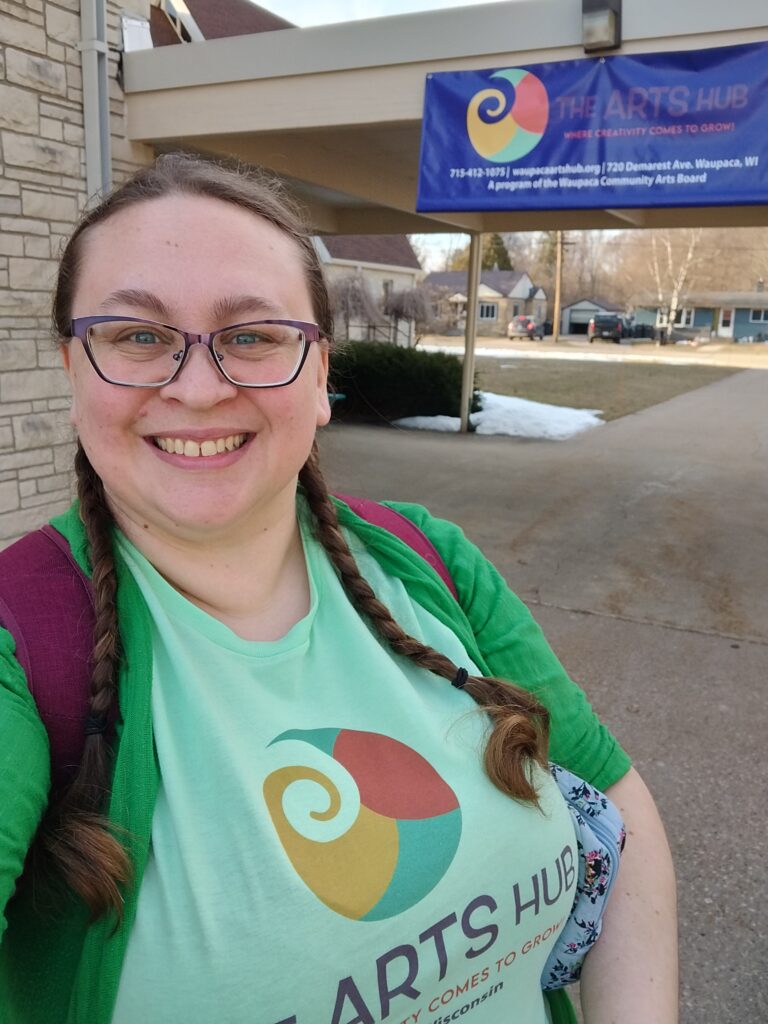

Recently hired as the Waupaca Community Arts Hub’s new administrator, Rachel Bailey will be the new face all students and their parents will greet when they arrive for art and cooking classes, or for music lessons. Bailey will handle the day-to-day operations at the Arts Hub, as well as marketing and support tasks.
Bailey also is the social media director for another non-profit, The Chris Patterson Memorial Foundation, and has a long history of participating in the Fine Arts as a French Horn player for her high school and the University of Wisconsin-La Crosse marching bands. “Fine Arts education had a large impact on who I grew to be as an adult. The Arts wing of my high school definitely was where you could find me partaking in most everything that was offered,” Bailey said.
Bailey said that she has experienced first-hand how being involved in the Arts gives youth outlets for self-expression, creates a sense of community for them, and teaches lessons that reinforce those learned within the academic classroom. “I am excited to be joining the Arts Hub and I’m looking forward to helping the Arts Hub grow and move forward by strengthening community partnerships that help us reach even more members of the Waupaca community, especially our youth.”
After graduating with a degree in archaeology, Rachel married her college sweetheart, and Waupaca native, Eric Bailey. They relocated from La Crosse to her hometown area of Lake County, IL, where she worked in the museum education field developing and teaching youth programs.
Bailey began working for the CPMF when it was created to honor her cousin, Christopher Patterson after he was killed while serving with the Indiana National Guard in Afghanistan. The Foundation seeks to honor his legacy by supporting the arts, particularly through the local schools near where Chris grew up, where $21,000 in cash awards have been presented to local high school seniors who participated in the fine arts.
During her time in Illinois, Bailey and her husband had three sons and dreamed of returning to Wisconsin. They were able to make that happen early in the fall when Eric was hired as the Director of the Waupaca Public Library. Bailey said that her family is looking forward to starting this new chapter of their lives here in Eric’s hometown of Waupaca, where they are living in his childhood home. “One of our sons has already started in his father’s footsteps by playing hockey with WAYHA on the same rink that his dad played on from his childhood through his high school years,” Bailey said.
“We are so pleased to have someone of Rachel’s caliber, skills, and passion helping us grow our programs and make the arts more accessible to everyone in our community,” said Arts Hub Chairman Laura Reynolds. A program of the Waupaca Community Arts Board, the Arts Hub is critical to the Arts Board’s mission of creating community through the arts, said WCAB President Marci Reynolds. “We look forward to working with Rachel as she helps us make the Arts Hub what we always have dreamed it could be,” said Marci Reynolds. “We just love her.”
Waupaca Arts Hub Press Release March 2023
Leave a Reply

The Chris Patterson Memorial Foundation is excited to announce the 2022 recipients of the Chris Patterson Performing Arts Award.
West Aurora High School
From West Aurora High School, the recipient was David Simpson!
The Winning Submission
After months of preparation, performing on stage gives a rush of adrenaline and a sense of accomplishment. However, acting and singing in choirs at West Aurora High School also gives me skills that I use daily, even in classes that aren’t fine arts-based. One crucial factor for performing, whether that’s in a play or musical, or concert, is working with those around you. This is a major part of performing, trusting in, and becoming confident with those around you. This is something I use in all my classes, especially when working on a group project. The companionship and trust I learned from being on stage also translate to the classroom.
Additionally, another way that performing arts has helped me is feeling comfortable asking questions. As simple as it sounds, asking questions can sometimes be difficult, especially in a core curriculum class. However, in my fine arts courses, I find myself asking questions all the time checking on a note or my blocking, or just seeking clarification. Without realizing it, throughout my four years in high school I have become less afraid or worried to ask questions in core classes. The confidence that performing instills in me is a huge asset to me in the classroom.
This confidence shows up in other ways as well. I also have become less nervous when presenting or giving speeches in front of the class, because of my experience in the performing arts. Having that prior experience helps to calm your nerves and have fun when presenting a speech or project. Without even realizing it, the performing arts have given me so many additional valuable talents and confidence that apply to all parts of my life. This helps me under the lights on the stage or in the classroom when prepping for a project or test.
As I look ahead to college where I plan to continue my studies with a major in Musical Theatre at Illinois State University, I will carry these ideas and experiences with me. The performing arts are a part of my life, on and off the stage, whether I had realized it or not, and I am better because of it.
Batavia High School
From Batavia High School, the recipient was Julianna Anderson!
The Winning Submission
I have been in Orchestra since I was in fifth grade. It has been around eight years that I have been participating in music, and for some years I participated in dance competitions. Therefore, I have spent over ten years in the performing arts, and I have always considered it a part of my life that I will never get rid of. Without the performing arts, I do not think that I would have the success I do today in my academic life.
In elementary school, I struggled with most subjects and even took additional speech classes that my other classmates weren’t taking. For some time, I was even on an IEP due to my difficulty in learning and catching up with my age group. Once I started playing cello in fourth and fifth grade, I started to have more success in my classes. Starting in seventh grade, I started to maintain a 4.0 GPA and maintain straight A’s throughout the rest of my years at middle school. Then, once I got to high school, I started to take more rigorous classes such as AP subjects, Dual Credit classes, and Honors classes. Music is most definitely the biggest factor in my academic success. Without it, I do not believe that I would be able to maintain the time management and complex thinking skills that I have today.
I believe that music has made me into an amazing student that is able to pick up concepts better than I ever could before. Because of music, I have a hobby that I can look forward to, relax, and de-stress from studying in my core subjects. It has also allowed me to continue my French education so that, eventually, I will be bilingual. I am excited to be able to further my education in college, and I know that it will be thanks to the fact that I am a performing artist.
East Aurora High School
From East Aurora High School, the recipient was Daniela Velazquez!
The Winning Submission
Ever since the 5th grade, I have always been actively involved in both band and choir. Once I got to high school I joined as many ensembles as I could. I joined and auditioned into my school’s top band and choir; I played in both Jazz Bands; I was in the marching band as a member and a section leader; I was part of the pit for our musical; I auditioned for ILMEA and got to perform with the honors Choir twice. I did all this while taking all honors and AP classes. Doing so much has led to classmates calling me a “try-hard” and “extra” but while they laughed at me for being an overachiever, I learned important skills such as time management and refinement which have transformed me into a student who always gives it their all inside and outside of school.
The countless hours I spent practicing inside of the practice rooms, whether it be playing runs on the flute or singing difficult harmonies, taught me how to effectively look at music in different ways to help me achieve the product I desired. I have seen this translate into my classwork as I look at different ways to approach writing assignments and as I choose what words to use in a well-thought-out essay. Like the music I play, I took a step back and looked at it as a whole. I tried to convey emotion and story through my words in the same way I did my music. I found myself mirroring my legato and expressive playing in my long and poetic writing. My staccato rhythms and accented notes transformed into the scribbling of my pencil as I wrote sentences and clicked my pen. The creativity I learned from my playing directly translated into my poems for class.
Aside from that, the sight-reading I did in band and choir taught me how to be quick on my feet which has proven to be useful in most if not all of my classes. It’s helped me prepare for timed tests in math, literature, and history. It’s taught me to accept my mistakes in pretests and learn to appreciate the growth I show in final tests just like seeing the improvement from my first sight read all the way to my concert performance.
I’ve loved and enjoyed every performance I got to be a part of and cannot imagine who I would be without music. I mean it when I say that performing has taught me discipline and application. It’s also most importantly taught me how to enjoy school and all the opportunities given to me. I only hope that I can continue to fill my life with my love for music and education as I continue to grow as a musician and into adulthood.
Kaneland High School
From Kaneland High School, the recipient was McKenna Goss!
The Winning Submission
I’ve loved performing arts since elementary school. I always felt like I truly came alive the second I stepped on that stage. Being in the performing arts has taught me that fortune favors the brave. David Walsch once said, ” Life starts at the end of your comfort zone”. Performing arts has pulled many valuable traits out of me that have helped me in high school, and that I know will help me as I move forward in life beyond high school.
Being a performer means ignoring your fears, getting up time and time again to perform even if you’re shaking. Pushing myself past my fears repeatedly has made me confident in my education because everything pales in comparison. When it comes time in my AP Spanish class to present and I get the normal jitters, I feel comfort knowing all the times that I’ve gotten through the fear just fine.
A couple of years ago I was talking to an upperclassman in theater, and he said something that stuck with me. Sitting on the floor in the music hallway, he talked about how he kept auditioning and performing because he learned to love the fear and the rush that comes after. He said that eventually, that fear left him and now it’s second nature. Ever since, I have continued to ruthlessly throw myself at opportunities to reach this level of homeostasis, if you will. The performing arts have given me the priceless trait of being confident in myself in the face of adversity.
Performing arts has also taught me to be insanely open-minded and accepting of fellow students in school. Putting myself in the shoes of various characters has allowed me to empathize more with the people in my life similar to those characters. Diving into the psychology of different characters has also taught me more about myself. In English class, I analyze characters from our books the same way I would analyze a role. Character analysis definitely is a skill that I use both in theater, the classroom, and in life. In the future, I will use the things I’ve learned to approach the world with empathy.
The valuable lessons I’ve learned from theater have enriched my high school education and I am confident they will enrich the rest of my life. We never know how long we will have on this earth, so with the time we have, I am so grateful that I have had such a loving, impactful environment that has helped me grow in many areas of my life. I look forward to the future where I can continue to perform and inspire others to become their best selves as well.
Geneva Community High School
From Geneva Community High School, the recipient was Hannah Thill!
The Winning Submission
In the midst of a chaotic school day, I place my viola on my shoulder and draw my bow across its strings. For 50 minutes, I am transported out of the school, completely enthralled in the world of orchestra. I have always been an honors student, with a schedule packed with courses designed to challenge every area of my mind, but orchestra is a release. Challenging as it may be, music provides a release, a chance for me to express whatever emotions I may be feeling into art. Recharging for the school day, music leaves me more focused and ready to tackle the concepts of my core classes.
As I play a Bach fugue, I notice the patterns in the music, and how the melodies and counterpoints interact between sections and seamlessly transform over time. Seamlessly threaded together, a pattern can be found in this art. Finding patterns in life is necessary; from geometric sequences to sentence structures, patterns dictate how we live. Identifying these patterns in music has translated into my academic courses, translating the creativity I thrive in into logic.
But music isn’t solely about patterns, as prominent as they may be. Music expounds upon human emotions. Every feeling is perfectly planned out, the sheet music in front of me is a roadmap of emotions. How is this any different than in an English class? The author uses their sentence structure and words to generate emotions just like composers with their music.
All of this, identifying patterns, and seeing how emotions are seamlessly woven into every aspect of life, translate into my core classes. I find myself excelling through these lessons music teaches me, and I use the escape my orchestra class provides me to prepare for the courses ahead of me. The bell rings, and orchestra class is over, but the lessons learned in orchestra will remain with me throughout the day, throughout my life.
We are proud to be able to support two organizations through the Chris Patterson Memorial Motorcycle Ride again this year. Through the proceeds of this event, we donated $2,600 to Freedom Farms for Vets in Wadsworth, IL, and $2,600 to the Music Ministries at Immanuel Lutheran Church & School in Batavia, IL. Donations like this are only possible because of the generosity of our donors and we thank you for making our mission to honor Christopher’s legacy possible! For God, For Country, For Music



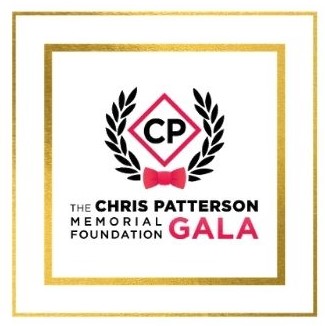
The 2022 Red Tie Gala will be held on March 5th, 6-10 pm at the Aquaviva Winery in Maple Park, IL. We are looking forward to holding this event again after the two-year hiatus because of the pandemic. It is sure to be a fantastic evening!! We hope to see you all there! Tickets will go on sale soon.
Join us as we put the “FUN” back in Fundraising! This is our major fundraiser. It is a semi-formal, exclusive night and always includes amazing music, food, and auction items. The proceeds from this event go towards funding our yearly Performing Arts Awards. Currently, we offer these awards at 5 area high schools. Each is a $1000 cash-award given to a graduating senior who has participated in the Performing Arts. For more information about these awards and how to apply visit our Awards Page.
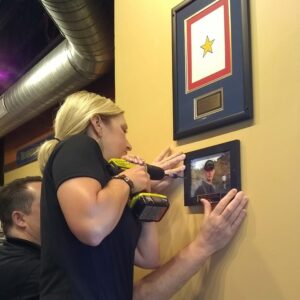
Mission BBQ in Downer’s Grove has created a Gold Star Wall. Earlier this month, Christopher’s picture was the first to be added.
If you aren’t familiar with the term Gold Star, it originated during World War I when families would hang a blue star in their window to show that they had a loved one serving in the armed forces. If their family member was wounded the blue star was replaced with a silver one and if they died in service it was replaced with a gold star. The family is referred to as a Gold Star family. You might also see the term used with relationship titles such as Gold Star Mother, Gold Star Father, or Gold Star Siblings. This tradition still continues today.
MISSION BBQ (Downer’s Grove, IL) is one of the sponsors of The SPC Chris Patterson Motorcycle Ride on Saturday, August, 14th, 2021. Other sponsors include Excel Automotive Repair (St. Charles, IL), Gun Barrel Coffee (Batavia, IL), and Fox River Harley-Davidson (St. Charles, IL).

The Chris Patterson Memorial Foundation is excited to announce the 2021 recipients of the Chris Patterson Performing Arts Award.
West Aurora High School
From West Aurora High School, the recipient was Allison Tremaine!
The Winning Submission
Stillness. In spite of all of the performances, bonding sessions, and rehearsals; the stillness of walking back to your car resting under the streetlamp of an empty parking lot gave me one of the most surreal feelings I have ever experienced. One that can only be achieved by waking up at 5 am, going to school, stressing about when you’re going to find the time to do your AP homework, and staying until 11 pm after a disastrous first day of tech week. While being involved in stage crew, wind symphony, marching band, and pep band; I’ve grown accustomed to a rigorous schedule. The time management skills I’ve gained over the years have helped not only maintain my grades as I do the things, I love but have also kept me from losing my sanity. Especially on the Fridays when I had crew after school, a football game after that, and a paper on The Crucible due the same night.
With covid, the days melted together. Without being able to rehearse like we normally do, my appreciation for the fine arts surfaced as I came to realize that it is the reason many students find the motivation to go to school and have their work done for class. With the monotony of sitting at home typing on the computer for 8 hours a day, thank goodness marching band drilled a sense of discipline into me. Otherwise, I am fairly certain I would not have the grades I do right now. While I don’t miss practicing slides or run-on-step in 90-degree weather, the mental and physical discipline from marching band did come in handy when I was about to have a break-down over the sea of AP Physics work I had to do at the end of Junior year when the lockdown began.
The one overarching theme I’ve found that can reach every area of the fine arts is that time passes, but family stays. I had been asked before a football game by a reporter from the school newspaper, “what is one word that describes the fine arts”, and I of course said “family” She laughed and told me about how every person she interviewed had given her the same answer. Since most of the students in the AP programs are also in the fine arts, it was very easy to translate that sense of community to a classroom environment. Since we all knew each other, it made my learning experience so much easier because I didn’t have to deal with the anxiety of meeting and trying to get along with new people.
To think I wouldn’t have met so many more of these amazing people if I hadn’t been scared into joining stage crew. Yes. Scared; by my trumpet section leader my freshman year to be exact (who would later play Seymour in our production of Little Shop that spring). The connections and motivations that the fine arts give me to do well in school are what have gotten me through my last four years at West. And when I close my eyes and see my car in the distance, bathed under the warm light of that streetlamp, I will remember the friendships, heartaches, laughter, and tears that allowed me to achieve academic success thanks to the fine arts.
Batavia High School
From Batavia High School, the recipient was Alexander Holzman!
The Winning Submission
Most nights before the pandemic, after everyone else had gone home, you would have found me still at school if you peeked in practice room F. It is so rare to get a moment to play music alone, with no one else listening in—no audience and no expectations from anyone else—and I took advantage of every one of those opportunities. Being in performing arts has taught me not to take chances for granted, among other things, shaping me and who I am today.
Whether it is when I play flute in band class, or piano for myself, I know I am where I belong. There is a bond that cannot be broken. I pour not just my effort but also my emotions into music—fear, anger, sadness, and hope—and it gives me satisfaction in return.
Music has brought me out of my middle-school bubble. When I first started high school, I was nervous, awkward, and, honestly, a little antisocial. A grueling marching band repertoire of 8-hour practices, 6 days a week did most of the work for me. Standing side by side, day in, and day out, with 100 kids for a whole summer? We could not help but bond. Before my freshman year, I would never have expected to go to an escape room and a hiking trip with anyone, much less the 5 flutists that became my closest friends.
In marching band, our competition scores are not just based on the group as a whole, but also focused on individuals. Therefore, in practice, everyone constantly focuses on ways to get better—and your friends or leaders will help correct you when you mess up or when there’s a really difficult part of a show. However, they will not truly catch the smaller details unless you actively mention it. By being in marching band, I learned how to ask for help, rather than waiting for people to help me. When I am in class and do not understand something, I am now confident enough in my own ability that I can turn and admit to a friend that I do not get it and ask them to explain.
Band also underscored the value of self-reliance. Mr. Owen and BVK, my band directors, would always mention “Rule number 9” in the midst of a school concert or marching band competition. Everyone recited it as soon as it came up: “Figure it out!” No one else was going to hold me accountable—I had to hold myself accountable. One time, we were at a football game and had left the field to warm up. Horrified, I realized that I left my hat on the bench in the rush off the field, but it was too late. So, I waited until we entered again and were watching the cheer team’s performance happen ahead of us. I quickly ran and grabbed my hat. This newfound sense of independence that I had transferred over to my classes as well—I did not need someone supervising me for when I did poorly on an assignment or test because I was already looking ahead at the next steps and how to improve. I figured it out.
Like individual notes joining to create a song, music has come together in many ways throughout my life, playing a crucial part in shaping my expectations, my personality, and whom I choose to be.
East Aurora High School
From East Aurora High School, the recipient was Alan Terrazas!
The Winning Submission
Participating in the performing arts ended up being more beneficial than I anticipated when I first picked up the alto saxophone in fifth grade. Back then, I used to believe that being part of my school’s concert band would only be something to enjoy on the side while I focused on school. However, when I began to take it seriously in high school, it became a whole different story due to the fact that we now had auditions. My personal drive and my rigorous practicing in order to be, and remain, in the top bands ended up helping me improve my quick-thinking abilities, explanation skills, and motivation which proved beneficial in the core classes I took in high school.
Being able to think quickly and critically is a skill that every musician should have. The ability to recognize, prepare, and react to the rhythms as quickly and accurately as possible is critical in either a sight-read or a change in music during rehearsal. Having been doing this for several years helped me greatly in my math and science courses. In these classes there are usually, a lot of material and concepts to cover within a unit meaning they are often fast-paced and usually have a lot of content in their exams. When confronted with a problem, I would quickly recognize what it was asking, I was able to plan the equations necessary, and finally, write everything down. It was because of the quick-thinking skills that were strengthened in the concert band, tests in these courses were a lot easier to complete while still being highly accurate.
Whenever we did not pick up our instruments, we had writing assignments that focused on how a section of music felt and how their musical elements helped enforce that feeling. We developed arguments to prove our claims, similar to how most languages and history courses developed arguments. When working on these assignments, I tried to be as descriptive as possible as music can often be difficult to interpret. This benefited my language and history courses when it came to writing argumentative essays as I would try to use the evidence I found to their full use and explain them thoroughly to help prove my claim. This is shown in my AP test scores as I managed to pass both the English Language and U.S. history exams with a 5 and a 4. If it wasn’t for those assignments, my writing abilities would not be as heightened as they are today.
My motivation took a toll between my sophomore and junior year due to a surgery that I had over the summer. Once I physically healed, the marching band season was only one week away. I hadn’t mentally healed before the marching season began however, little by little I began to feel better and better. Marching with my friends and performing with them helped me get out of my stump and start remembering all of the reasons why I kept pushing forward every day. Being on that field and rehearsing drills got me active again and helped me feel better about myself. I felt so much more motivated that at the end of the year I decided to run for drum major and eventually obtain the position. I would have done my absolute best as drum major if the pandemic didn’t occur. Coming back after my surgery I wasn’t too excited at first, but once I arrived, I felt much better. Being out there helped return my drive to keep improving not only my musicality but in my education and in life as well.As I mentioned before, being in the performing arts helped me increase my quick thinking, explanation skills, as well as my motivation which led to a benefit for all non-music-related courses. Without the aid of my concert band courses over the past four years, I would not be this well of a student nor be this well a musician. As a result, I see myself going to a four-year college next year and beginning my studies to become a pediatrician where I can put the abilities I gained into full use.
Kaneland High School
From Kaneland High School, the recipient was Maxine Ocampo!
The Winning Submission
Being involved with the performing arts all throughout high school has greatly assisted me in my core educational classes. This is because being a part of the arts program has helped me come out of my shell and express myself more. Back when I was a freshman, I was a pretty quiet kid who mostly kept to herself. However, after four years of participating in marching band, winter percussion, percussion ensemble, and seven theater productions, I can confidently say that I am not the same shy student that I used to be. By being more comfortable and open with my band and theater families, I started to gain more confidence in myself, which in turn helped me be a more active student during my day-to-day classes. I started being more involved in class discussions, became more open to collaborating with other students when it came to classwork, and took more initiative in group projects than I previously would. My leadership skills are also another reason for this, as I have greatly improved upon these skills from being given leadership roles in theater, such as student director and stage manager. By being placed in these positions, I learned how to take control over certain situations when needed and how to properly lead a group of people. I also learned what type of leader I strive to be, which is someone who takes care of those they are responsible for and makes sure that nobody feels left out in any way. After growing into a more active student who is more confident in herself and more open to communicating and connecting with others, I currently feel ready to take on the next chapter of my life beyond high school, and I have the performing arts to thank for that.
Geneva Community High School
From Geneva Community High School, the recipient was Hannah Bolender!
The Winning Submission
The impact on Music in my Education
At age six, I attended my first violin lesson, slowly learning the building blocks to becoming the musician that I am today. My teacher was strict but taught me to strive for my best. In the seventh grade, I participated in my first youth symphony. There, we dissected Dvorak’s New World Symphony by its “chapters”, articulating the colors and emotions that the music communicated. In taking music theory for the first time, math finally felt applicable. As a teacher with six violin students, I’ve learned the value of education firsthand, and how to cater a lesson to the best of a student’s needs.
These music concepts flowed directly into academic strengths, and I found myself using the same tools in high school. I studied in the same way that I learned a piece, made use of auditory and visual techniques, and never hesitated to ask for clarification. More specifically, the learning curve of violin has taught me how to tackle physics with patience and practices Symphony rehearsals taught me the value of deep analysis that I now carry through my passion for literature and writing. It has driven my interest in the government, and I hope to carry that through law school. My participation in school orchestra, music theory classes, and community arts programs has left me a toolbox of resources, ultimately making me a strong, confident, and articulate voice in my community.
Leave a Reply